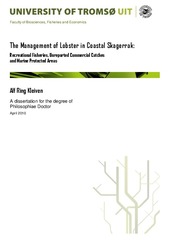| dc.contributor.advisor | Sønvinsen, Signe | |
| dc.contributor.advisor | Hersoug, Bjørn | |
| dc.contributor.author | Vik, Christian | |
| dc.date.accessioned | 2019-09-09T12:45:49Z | |
| dc.date.available | 2019-09-09T12:45:49Z | |
| dc.date.issued | 2019-05-15 | |
| dc.description.abstract | Over the last 50 years, the management needs of the Norwegian aquaculture industry have become increasingly complex. The stakeholders in the management vary diversely from environmental agencies and NGOs, to local and national governmental bodies, to those operating the farms themselves. Consequently, the establishment of the Traffic Light System as a management tool has been a long and challenging process. There has been a great deal of criticism regarding its inbuilt collective punishment with regards to capacity reduction. To avoid this, the authorities have created exemption rules to the action rule, commonly referred to as §12. This paper explores how the exemption rules (§12) affect the legitimacy and social acceptance of the Traffic Light System. Moreover, it seeks to understand how the Traffic Light System affects the social sustainability of the Norwegian aquaculture industry more broadly. The design of the paper is qualitative research in the form of document analysis and formal structured interview. Three different farmers, one representative from the NFSA and one from the Directorate of Fisheries were interviewed individually by phone. White papers, consultation documents, hearings and applications were scrutinized in the document analysis. The findings indicate a lack of trust towards those creating the management structures. With such a system in place, an exception rule is deemed absolutely necessary. The study shows that the criticism towards the TLS was so strong that there may not have been enough support to establish such a system without exception rules. The exception rules allow the TLS to be accepted, with the consequences that the aquaculture industry is managed with regards to its impact on the environment. The study reveals that there is no use of discretion when handling the exception rule, and this is both positively and negatively viewed by those surveyed. Importantly, the study demonstrates that in spite of §12, there still exist strong doubts from the farmers towards the TLS, indicating a persisting lack of content legitimacy. Yet there is also a sense of understanding that the TLS - aided significantly by the instigation of §12 – is the start of a new management system, which despite needing further research, could become a valid management structure for the industry. Overall, the fragility of the social sustainability of Norway’s aquaculture industry will depend heavily on the continuation of both economic and environmental sustainability. | en_US |
| dc.identifier.uri | https://hdl.handle.net/10037/16142 | |
| dc.language.iso | eng | en_US |
| dc.publisher | UiT The Arctic University of Norway | en_US |
| dc.publisher | UiT Norges arktiske universitet | en_US |
| dc.rights.accessRights | openAccess | en_US |
| dc.rights.holder | Copyright 2019 The Author(s) | |
| dc.rights.uri | https://creativecommons.org/licenses/by-nc-sa/4.0 | en_US |
| dc.rights | Attribution-NonCommercial-ShareAlike 4.0 International (CC BY-NC-SA 4.0) | en_US |
| dc.subject.courseID | FSK-3910 | |
| dc.subject | VDP::Landbruks- og Fiskerifag: 900::Fiskerifag: 920::Andre fiskerifag: 929 | en_US |
| dc.subject | VDP::Agriculture and fishery disciplines: 900::Fisheries science: 920::Other fisheries disciplines: 929 | en_US |
| dc.subject | VDP::Landbruks- og Fiskerifag: 900::Fiskerifag: 920::Akvakultur: 922 | en_US |
| dc.subject | VDP::Agriculture and fishery disciplines: 900::Fisheries science: 920::Aquaculture: 922 | en_US |
| dc.title | Seeking to legitimize: Social sustainability and legitimacy in the Traffic Light System | en_US |
| dc.type | Master thesis | en_US |
| dc.type | Mastergradsoppgave | en_US |


 English
English norsk
norsk



